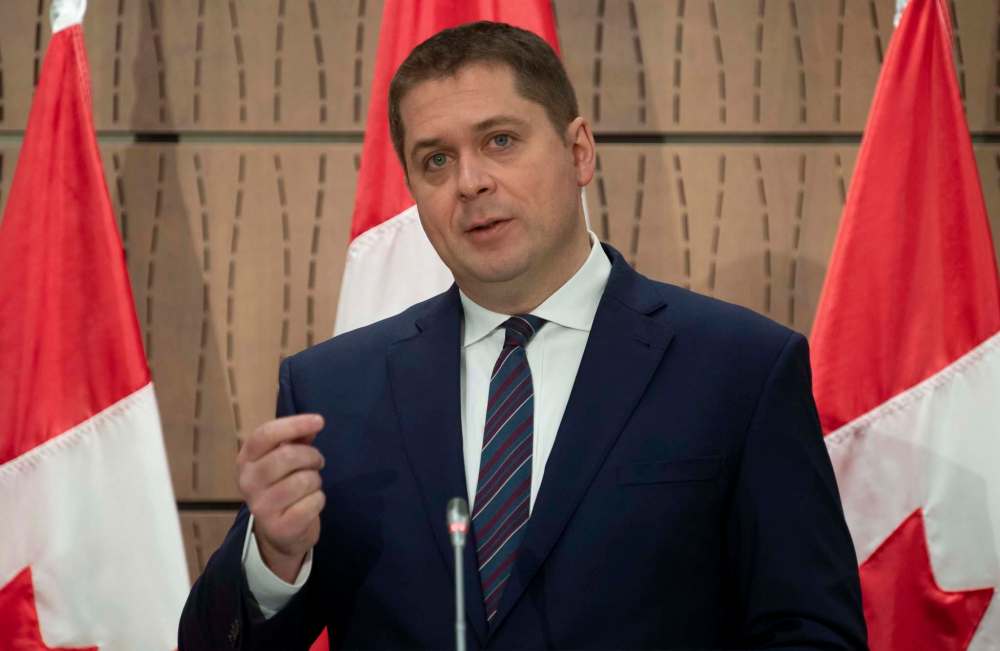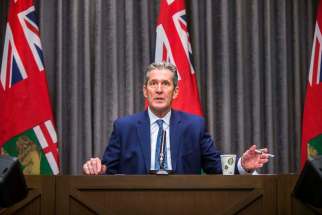Parliamentary business must carry on
Read this article for free:
or
Already have an account? Log in here »
To continue reading, please subscribe:
Monthly Digital Subscription
$0 for the first 4 weeks*
- Enjoy unlimited reading on winnipegfreepress.com
- Read the E-Edition, our digital replica newspaper
- Access News Break, our award-winning app
- Play interactive puzzles
*No charge for 4 weeks then price increases to the regular rate of $19.00 plus GST every four weeks. Offer available to new and qualified returning subscribers only. Cancel any time.
Monthly Digital Subscription
$4.75/week*
- Enjoy unlimited reading on winnipegfreepress.com
- Read the E-Edition, our digital replica newspaper
- Access News Break, our award-winning app
- Play interactive puzzles
*Billed as $19 plus GST every four weeks. Cancel any time.
To continue reading, please subscribe:
Add Free Press access to your Brandon Sun subscription for only an additional
$1 for the first 4 weeks*
*Your next subscription payment will increase by $1.00 and you will be charged $16.99 plus GST for four weeks. After four weeks, your payment will increase to $23.99 plus GST every four weeks.
Read unlimited articles for free today:
or
Already have an account? Log in here »
Hey there, time traveller!
This article was published 20/04/2020 (2058 days ago), so information in it may no longer be current.
The governing Liberals and the opposition Conservatives were not at their best on Monday defending their disagreement over reconvening Parliament amid the COVID-19 pandemic. Both sides were transparently manoeuvring for partisan advantage while offering flimsy pretexts in defence of their quarrel.
The House of Commons met Monday with a bare quorum of members distributed about the chamber, so as to respect the two-metre separation intended to prevent coronavirus contagion. Prime Minister Justin Trudeau had warned that all 338 MPs would have to fly to Ottawa and gather in the chamber, at great risk to their health, if the Conservatives did not accept his plan for scaled-down or virtual sittings.
The Conservatives did not accept his plan, but the scaled-down House met anyway. The hollowness of Mr. Trudeau’s previous warnings was evident.
Conservative Leader Andrew Scheer came up with a list of objections to conducting parliamentary business by video link. It could be unfair to members from remote rural and northern districts, such as Manitoba MPs James Bezan (Selkirk-Interlake-Eastman), whose internet connections are non-existent or slow. Mr. Scheer refuses to allow all MPs to take part in a virtual gathering because he thinks it could be unsatisfactory for a few, whom he has never identified.
Mr. Trudeau’s concern for the health of MPs and Mr. Scheer’s regard for the rural and remote members is all very considerate, but the heart of the matter lies elsewhere. Oppositions usually want Parliament to meet so they can publicly harass the government. Governments usually want to send Parliament away to spare themselves the harassment. The case is no different now.

The pandemic and the ban on large gatherings forced the ruling Liberals, with great regret, to send Parliament packing. Mr. Trudeau has been obliged to appear alone on national television each morning to address the nation, ask for compliance with public-health advice and describe the measures his government has adopted to help companies, families and workers that have been hurt by the stay-home orders.
To his credit, Mr. Trudeau has not abused these daily appearances in the way that is seen every day in Washington. U.S. President Donald Trump has used his television appearances to insult his political opponents, belittle state governors who find fault with his administration, pick quarrels with the journalists in front of him, offer medical advice outside his competence and call forward fawning guest speakers to praise him. Mr. Trudeau has been far more restrained in his use of the nation’s attention.
The excellence of Canada’s parliamentary system lies in the regular confrontation of government and official Opposition. The ministers who hold power must appear every day during parliamentary sessions to absorb the abuse, the accusations, the innuendoes, the raucous horse-laughs flung at them by the opposition.
Most of the opposition attacks are ill-informed or unfair, but the odd one hits home. Most of the government’s answers are evasive or disingenuous, but they must at least seem reasonable. The spectacle is unedifying, but it is the way Canada and other parliamentary democracies have developed for keeping the authorities honest — or at least curbing the most flagrant abuses.
The parties should agree to hold one virtual sitting of the Commons, empowering the Speaker to uphold the rights of all members. They should give members the chance to attend in person or by video link. They should find what goes wrong at the first sitting and make the second one better and the third one better still.







